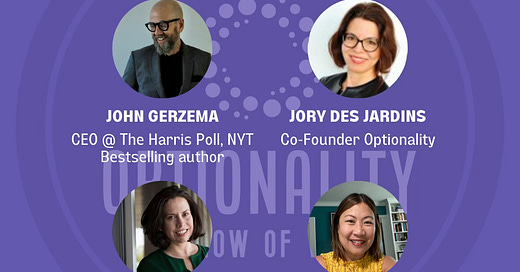Questions I have for our fractional work webinar
Come ask your own this Wednesday the 21st, open to all Optionality members
This Wednesday February 21 Optionality is hosting its first member webinar, open to all members, and I’m the lucky moderator. Lucky because I’m still pretty new to deciding this is the style of work I prefer, and I have lots of questions myself. Optionality wants to bring workers, management, and analysts and researchers together to make #TheNowofWork better, so we’ve lined up speakers who represent different points of view. And I’m ready to pepper them with practical and actionable questions! I’m giving you a sneak peek here, and I encourage you to add your own in the comments.
Questions about the overall workplace landscape
Author and CEO of The Harris Poll, John Gerzema, is used to working with and inside companies to help them anticipate and proactively respond to workplace trends, so I can’t wait to hear what he’s hearing out there from management teams. Some companies clearly seem to be pushing for full-time, fully-returned-to-office workforces, but according to, for example, the NY Times reporter who has been following this, the “debate is over” and hybrid isn’t going anywhere. Does that include hybrid part-to-full-time employment? And therefore fractional work?
Where is there the most opportunity, and conversely, where does the environment seem pretty inflexible and non-receptive to the idea? What should people look out for in company cultures, language, actions when considering pitching or joining them as a fractional?
Join us Wednesday at 2PM PT/5PM for this member webinar. Recording will be available to all registrants.
Questions about fractional work vs. consulting or full-time
Both my Optionality co-founder, Jory Des Jardins, and fractional CMO Julie Crabill have shifted from full-time to fractional CMO work in the past 3-4 years. It would be easy to attribute it simply to the changes wrought by the pandemic lockdown and recovery, but there’s more to it than that. Fractionals United has the definition of the difference between consulting and fractional leadership here, and I want to know if they agree this is how they’re thinking about the difference. I also want to understand the drivers for each of them and why they are specifically seeking “fractional CMO” work and not consulting gigs.
I also want to know what that meant for their lives, their families, and how they thought about everything from healthcare to retirement to vacation time. Do they see disconnects between how they want to be treated as a fractional and how companies who hire them initially think about their role?
What is the impact on their brains, their bandwidth, their boundaries, and of course their bank accounts?
Questions about the hiring manager’s point of view on hiring fractionals
Sheila Dowd has been a co-founder, but her past ten years have been spent with increasing responsibility and team management duties at large companies. What would motivate her to consider a fractional hire? And how does she socialize the idea in a scaled company that might be very used to full-time employment being the norm?
While prepping together for this discussion, I was really interested in the pathways Sheila saw as easier vs. more challenging to socialize. I think I had certain assumptions about that last issue that were off-base, and Sheila laid out a scenario I hadn’t even thought of.
Being primarily in the start-up sector, I’ve always seen fractional leadership as something that start-ups most commonly do when they don’t have the funding or the scale of need to justify a full-time C-level leader in a certain area. (BlogHer had a fractional CFO for years.) But that’s just one scenario, and it’s probably not a sufficient market to make fractional leadership a livelihood that’s widely available for all the folks considering it now. It’s good to explore the options that would be possible in more established companies (with more established budgets).
Those are some of starting discussion topics for Wednesday’s webinar. Did I miss something you’ve been dying to hear more about when it comes to the opportunity to be a fractional worker? Let me know.






Elisa reading through your questions I'm seeing so many parallels to when blogging/digital influence was taking off, and creators were forging real best practices around platform building. Some even dared to called their practice a business. One parallel I'm seeing out of the gate: There's still some work to be done in terms of formalizing best practices and generating an overarching understanding of what it means, on both the worker and hiring side, to engage in fractional work. There were some questionable practices back then--pay-per-post, for example; or sending people free stuff in exchange for a writeup--that were in some cases literally outlawed. Similarly I want to see best practices formalized around paid time off, structuring fractional work, prorating vs eliminating benefits, and offering stock/equity to fractional workers. Can't wait to talk more about this.